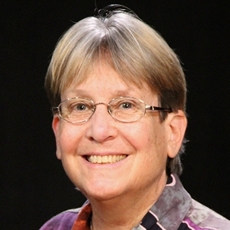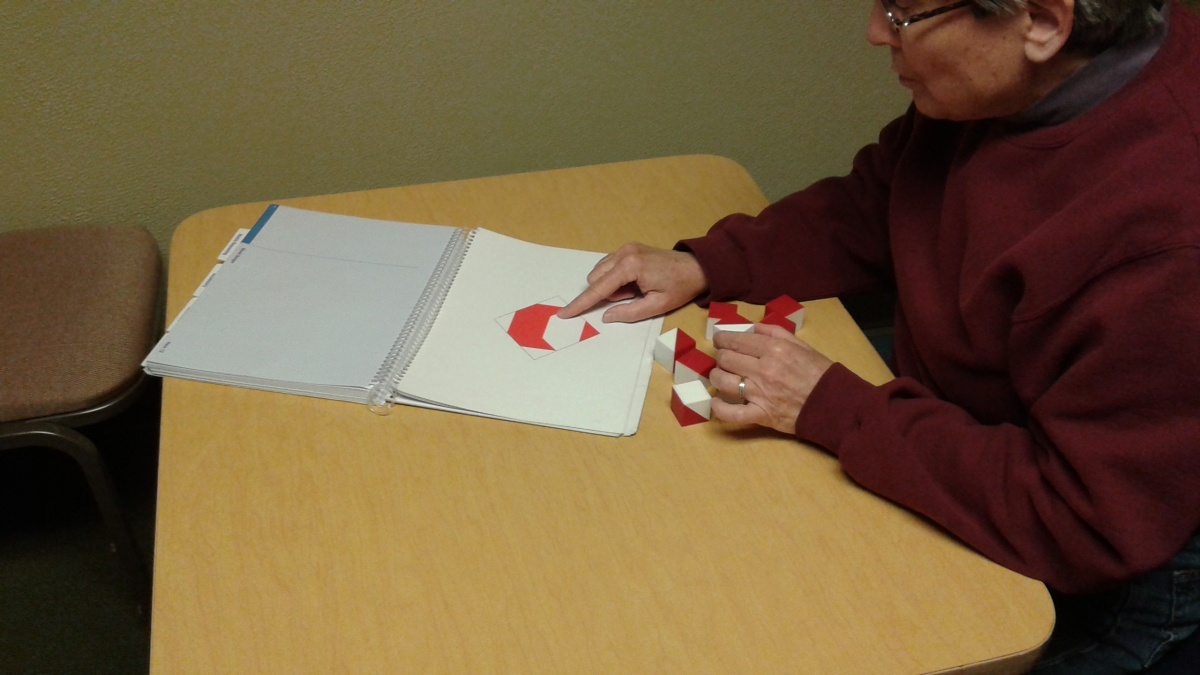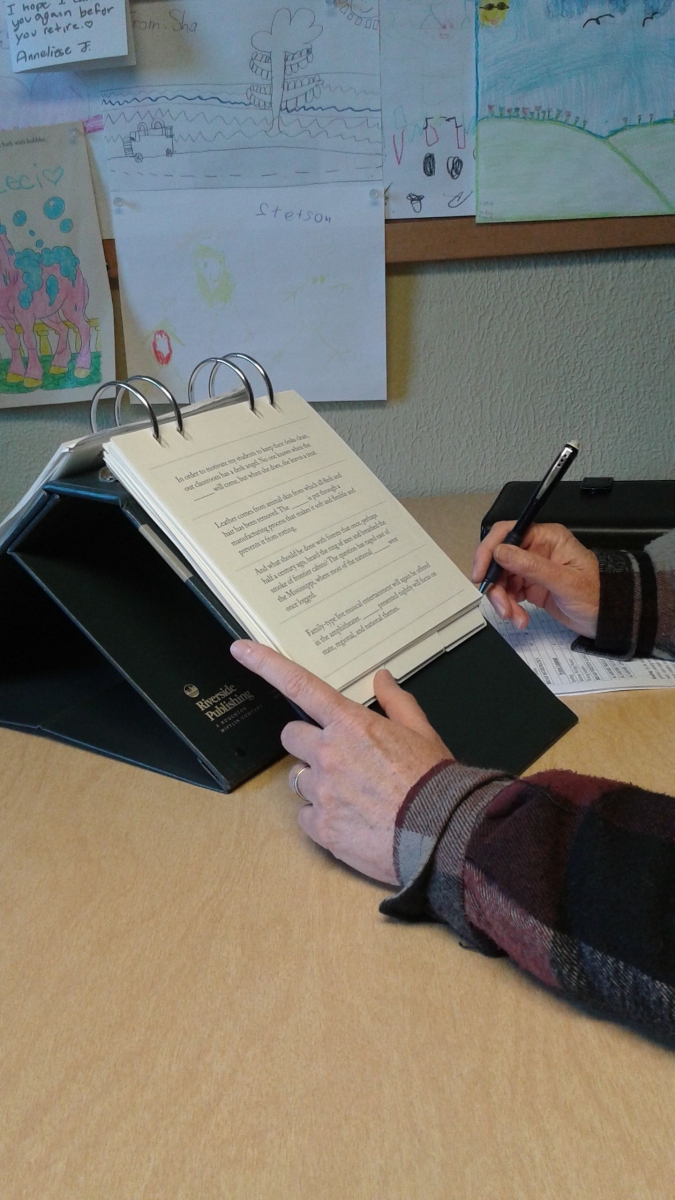My Long Journey to the Answer - Part 2
Posted on March 1, 2015
5 comments 2697 ViewsAssessment Day
By Carol Dennis
 Seven hours of oral and written questions, puzzles, and
interviews left me exhausted and exhilarated. The morning after, I felt like my
brain had run a marathon - buzzing from all the mental gymnastics. Exhausted,
exhilarated, and so glad I did it.
Seven hours of oral and written questions, puzzles, and
interviews left me exhausted and exhilarated. The morning after, I felt like my
brain had run a marathon - buzzing from all the mental gymnastics. Exhausted,
exhilarated, and so glad I did it.
The “it” was having myself tested to see if my long-held suspicion that I have a reading disability is true. (See my previous post for more details.) And the answer turns out to be: yes and no. I’ll explain that later.
A little background
I’m 62 years old, and had recently written an article about the Education Evaluation Center (EEC), part of Teaching Research Institute at Western Oregon University. After the article was published on the TRI website, the director at EEC asked me if I wanted to go through an abbreviated version of the assessment, just to get the feel of it. What he didn’t know is that I have wondered for most of my life if there was something “wrong” with me because I have always struggled with reading – avoiding it whenever possible.
I explained to him that this would not be just an exercise for me - a detached, journalistic experience – that I was a bit frightened and curious about what they might find. After a little more conversation, he offered to put me through a full assessment. Having met the staff and learning what they do and how expert and kind they are at doing it, I screwed up my courage and agreed. There was a preliminary interview, some questionnaires to fill out, and the date was set.
The assessment
The day of the assessment started when I arrived at the Education Evaluation Center offices at 8:30 on a Monday morning. I was greeted by two of the three people who would be working with me that day, and given a bit of an orientation – where I could find coffee, tea, cookies and the bathroom -- and I got an overview of how the day would go. I was pretty anxious, which they said was not unusual.
My first stop (after the bathroom) was a walk across the street with Marlene to the building that houses the College of Education. This is where the audiology lab is set up. There is hereditary hearing loss in my family, so having my hearing tested is very familiar to me. It was nice to start with something I’m so used to, and I knew what the results would be. No surprises.
Marlene then walked me back and handed me over to Bob who would take me through the cognitive tests.
Before we started, Bob said he wanted me to be open to the idea that sometimes our perception that we are not good at something is simply because we have nothing real to compare ourselves to. I offered a phrase that I have heard, “comparing my insides to other people’s outsides.” I agreed to be open to that. Bob also told me that no one is expected to complete all the tasks perfectly. The purpose is to find out at what point the tasks get harder for me. I said I understood, and we got started.
 I don’t remember the order of things, but it included a
series of memory games – repeating back numbers in the order that Bob had said
them – then repeating back numbers but putting them in numerical order. It got
harder as the string of numbers got longer. Then we moved onto identifying
what’s common between two words. It started with concrete things like a lion
and a monkey are both animals. But it got more difficult when the words were
abstract concepts, like “never” and “always.” Then I did a series of puzzles –
figuring out how to arrange small red and white blocks so they matched the
shapes on the pages. I found all this fun and enjoyed the challenge as each
task got harder.
I don’t remember the order of things, but it included a
series of memory games – repeating back numbers in the order that Bob had said
them – then repeating back numbers but putting them in numerical order. It got
harder as the string of numbers got longer. Then we moved onto identifying
what’s common between two words. It started with concrete things like a lion
and a monkey are both animals. But it got more difficult when the words were
abstract concepts, like “never” and “always.” Then I did a series of puzzles –
figuring out how to arrange small red and white blocks so they matched the
shapes on the pages. I found all this fun and enjoyed the challenge as each
task got harder.
Next was my time with Ken for the academic testing – reading, writing and math. This is where I needed a little hand-holding. I used to be pretty good at math and I consider myself a decent writer, but it was the reading that brought me here. This would be the test that would answer my questions.
First it was simple writing and math – finish this sentence, and what’s 4 X 8 (which I struggled with for a moment but then remembered how to do it). Then some vocabulary, which contained mostly words I knew, but just as Bob had said earlier, we would get to words I didn’t know. And then came the reading. Ken suggested a lunch break before we dove into that – and I am so glad he did. I needed the break.
After lunch, we jumped right in. Seeing dense paragraphs on
a page and knowing that Ken was about to click the button on a stopwatch and
say, “go,” I was nervous. But this is what I had come for! So, Go!!!!!

I don’t know whether there is usually a break scheduled after the academic section, but I’m sure it was obvious that I needed one. I sat for a little while in the waiting room, had another cup of tea and rested my eyes.
After about 10 or 15 minutes, Marlene came in, asked me a
few more questions, and presented me with a series of words to repeat back to
her. She said the next step would be for Bob to finish scoring everything, and that he’d
be here in a few minutes with the results. I had gotten through all the tests, and now
the answer was just a few minutes away.
My reflections
As I write this (two days after the assessment), I am
feeling very emotional, having a hard time focusing, and I don’t quite know
what to do with the new information that I received. When Bob came
into the waiting room at the end of the assessment day, he carried a book
and a small stack of papers full of numbers and technical terminology and
percentiles. Before he went over the results with me he said, “You don’t need to try to
remember any of what I'm going to tell you. We’ll send you a report.” Then he said, “Remember when I said that sometimes what we
feel is just our perception? Well, that’s not what’s going on here.” So, there really was an issue.
Okay. What did we find out? I thought I would remember all the details, but Bob was right – it’s kind of a blur. Here are the big picture concepts I walked away with. My reading speed and fluency (the ability to recognize words automatically) is nowhere near what it could be based on my cognitive capacity. My reading speed and fluency is at about a 12th grade level (higher than I thought it would be – there’s that perception Bob talked about), but it jumps up 6 grade levels if I’m given extra time and limited distractions. Wow, that’s a huge difference.
We didn’t talk about why this is the way it is. Could it be the concussion I had at 14, the very high fever I had when I was little, not being taught to read properly, something in my brain that just doesn’t decode words? I don’t know. There’s another expression I’ve heard through the years, “Don’t analyze, utilize!”
In this moment, I'm feeling kind of angry that I didn't look into this years ago, and I'm a little scared that I'll discover that I've been using my trouble with reading to avoid things I was just afraid to do. But because I went through the assessment and found out what is really going on, I can now legally ask for accommodations if I choose to go back to school or if a job requires a lot of reading. In a couple of weeks, I’ll have a report in hand that shows what I need to do my best.
I don't know yet what I will do with this information, but I do know that I will not dismiss an idea because I won’t be able to do the reading. I just need more time than most people – and when I get that extra time, look out world, here I come!
I'll write again after I get the report and have had a few more weeks to understand what all this really means to me.Click here to read Part 3
Recent Blog Posts
Project Spotlight: Creating Supports for Survivors of Gender-Based Violence Jun 6, 2018
Project Spotlight: Investigating Executive Function Concerns in Infants and Toddlers May 23, 2018
Project Spotlight: Reaching Out to an Underserved Population May 9, 2018
Project Spotlight: Fighting Against Gender-Based Violence Mar 14, 2018
Project Spotlight: Increasing Diversity in Early Childhood Educators Feb 7, 2018
5 Comments
Carol -- I admire your courage and honesty. Whether your reading is grade 12 or not -- you are a wonderful person with a great many skills that many of us will never acquire. I don't think I could do some of the things you do!! In the field of deafblindness, we talk about "literacy" from a much different perspective. We talk about how literacy means something different to different children -- and we look at the purpose of literacy, rather than literacy for literacy's sake. Remind me to share one of the articles I use on the topic! Kudos -- and thank you for sharing. Lyn
Carol,
Your story will and has impacted others to help them through their journey of getting to know themselves. Thank you for writing such a wonderful touching and emotional article. There is so much value in each story that each individual brings. We are so lucky here at TRI to have a support group of people who look to skill utilization.
Thanks very much for the supportive comments. It's always hard to take a good look at ourselves, and so nice to feel supported for doing it. This whole process has changed the way I look at things, especially as I walk across the WOU campus - a very deep feeling that I belong here. Thanks again!
Carol,
This was a journey for you and I hope you find some productive ideas about your adult learning needs and style as a result. I agree with others that working with you is inspiring and I always appreciate your clever insights and ability to take a step back and question what we do in our work. Those are skills lots of folks are missing!
Carol, thank you for sharing. I supported EEC through supplying a database when they needed it and enjoyed working with the team, but never really understood how they can change lives.
Posted Mar 2, 2015 by Andrea Fewx